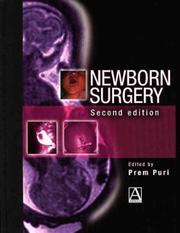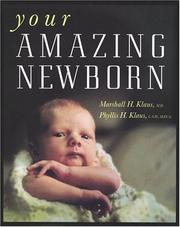
ISBN: 034076144X 9780340761441 Year: 2003 Publisher: London: Edward Arnold,
Abstract | Keywords | Export | Availability | Bookmark
 Loading...
Loading...Choose an application
- Reference Manager
- EndNote
- RefWorks (Direct export to RefWorks)
Book
Year: 2021 Publisher: London : IntechOpen,
Abstract | Keywords | Export | Availability | Bookmark
 Loading...
Loading...Choose an application
- Reference Manager
- EndNote
- RefWorks (Direct export to RefWorks)
Congenital anomalies constitute a large group of diverse biochemical, histological, and anatomical defects presenting at birth and caused by a myriad of inherently unrelated etiopathogenic factors. A significant number of cases are idiopathic. With striking variability in clinical manifestation, the outcomes range from inconsequential to lethal, with immense medical, social, emotional, and financial implications. The principles of management vary from medical, surgical, none, or both, and the surgical procedures can be lifesaving or merely cosmetic. This book discusses the epidemiology, etiopathogenesis, recurrence risk, and specific clinical and investigational evaluation of congenital malformations. In addition, the book reviews the embryology, anatomy, pathophysiology, and updated management concepts of some of the most complex and intriguing anomalies of the major organ systems.
Book
ISBN: 9782960069907 Year: 2007 Publisher: [Belgique] : Anne Pardou éditeur,
Abstract | Keywords | Export | Availability | Bookmark
 Loading...
Loading...Choose an application
- Reference Manager
- EndNote
- RefWorks (Direct export to RefWorks)

ISBN: 073820188X Year: 1998 Publisher: Cambridge Perseus
Abstract | Keywords | Export | Availability | Bookmark
 Loading...
Loading...Choose an application
- Reference Manager
- EndNote
- RefWorks (Direct export to RefWorks)
Book
Year: 2021 Publisher: London : IntechOpen,
Abstract | Keywords | Export | Availability | Bookmark
 Loading...
Loading...Choose an application
- Reference Manager
- EndNote
- RefWorks (Direct export to RefWorks)
Congenital anomalies constitute a large group of diverse biochemical, histological, and anatomical defects presenting at birth and caused by a myriad of inherently unrelated etiopathogenic factors. A significant number of cases are idiopathic. With striking variability in clinical manifestation, the outcomes range from inconsequential to lethal, with immense medical, social, emotional, and financial implications. The principles of management vary from medical, surgical, none, or both, and the surgical procedures can be lifesaving or merely cosmetic. This book discusses the epidemiology, etiopathogenesis, recurrence risk, and specific clinical and investigational evaluation of congenital malformations. In addition, the book reviews the embryology, anatomy, pathophysiology, and updated management concepts of some of the most complex and intriguing anomalies of the major organ systems.
Book
Abstract | Keywords | Export | Availability | Bookmark
 Loading...
Loading...Choose an application
- Reference Manager
- EndNote
- RefWorks (Direct export to RefWorks)
Periodical
Abstract | Keywords | Export | Availability | Bookmark
 Loading...
Loading...Choose an application
- Reference Manager
- EndNote
- RefWorks (Direct export to RefWorks)
Book
Year: 2023 Publisher: Washington, DC : National Academies Press,
Abstract | Keywords | Export | Availability | Bookmark
 Loading...
Loading...Choose an application
- Reference Manager
- EndNote
- RefWorks (Direct export to RefWorks)
Pilot programs are employing whole genome sequencing and whole exome sequencing during the newborn phase both within the United States and internationally. While sequencing offers the opportunity to screen for treatable but not clinically evident conditions early in a childs life, it raises a host of ethical, legal, and social questions for experts, including parents, to consider. The National Academies Roundtable on Genomics and Precision Health hosted experts from health care, industry, academia, the federal and state governments, and patient and consumer advocacy groups for a June 2023 workshop. Participants explored the potential benefits and harms, data security, and health equity considerations for the widespread utilization of newborn genome sequencing in the U.S. This publication summarizes the presentation and discussion of the workshop.
Book
Year: 2023 Publisher: Washington, DC : National Academies Press,
Abstract | Keywords | Export | Availability | Bookmark
 Loading...
Loading...Choose an application
- Reference Manager
- EndNote
- RefWorks (Direct export to RefWorks)
Pilot programs are employing whole genome sequencing and whole exome sequencing during the newborn phase both within the United States and internationally. While sequencing offers the opportunity to screen for treatable but not clinically evident conditions early in a childs life, it raises a host of ethical, legal, and social questions for experts, including parents, to consider. The National Academies Roundtable on Genomics and Precision Health hosted experts from health care, industry, academia, the federal and state governments, and patient and consumer advocacy groups for a June 2023 workshop. Participants explored the potential benefits and harms, data security, and health equity considerations for the widespread utilization of newborn genome sequencing in the U.S. This publication summarizes the presentation and discussion of the workshop.
Book
Year: 2011 Publisher: Geneva : World Health Organization,
Abstract | Keywords | Export | Availability | Bookmark
 Loading...
Loading...Choose an application
- Reference Manager
- EndNote
- RefWorks (Direct export to RefWorks)

 Search
Search Feedback
Feedback About UniCat
About UniCat  Help
Help News
News